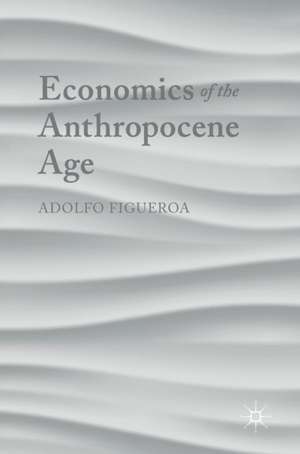Economics of the Anthropocene Age
Autor Adolfo Figueroaen Limba Engleză Hardback – 5 sep 2017
This book uses Figueroa’s unified theory of capitalism to explain how economic growth has led to a new epoch, the Anthropocene, and it presents a new set of economic principles that are needed in this new age. The policies presented in the book are derived from an empirically corroborated scientific theory. Therefore, this book is unique in its discussion of public policy as the result of scientific knowledge, rather than based on ideology or private interests. In the new epoch we have entered, man is now the main factor in the fate of the Earth, and in social terms, the Anthropocene age also implies a period of high and persistent income inequality in the capitalist system, with the consequence of social disorder. Figueroa considers these conditions and addresses fundamental problems of our time, such as the ideal organization of production and distribution, and the functionality of a zero-growth society. Standard economics would approach these problems under the assumption
that we still live in the Holocene age, but in this book, Figueroa both explains and develops new economic principles for this new context.| Toate formatele și edițiile | Preț | Express |
|---|---|---|
| Paperback (1) | 694.87 lei 6-8 săpt. | |
| Springer International Publishing – 12 mai 2018 | 694.87 lei 6-8 săpt. | |
| Hardback (1) | 701.59 lei 6-8 săpt. | |
| Springer International Publishing – 5 sep 2017 | 701.59 lei 6-8 săpt. |
Preț: 701.59 lei
Preț vechi: 825.39 lei
-15% Nou
Puncte Express: 1052
Preț estimativ în valută:
134.25€ • 140.17$ • 111.11£
134.25€ • 140.17$ • 111.11£
Carte tipărită la comandă
Livrare economică 04-18 aprilie
Preluare comenzi: 021 569.72.76
Specificații
ISBN-13: 9783319625836
ISBN-10: 3319625837
Pagini: 244
Ilustrații: XXIX, 272 p. 4 illus.
Dimensiuni: 148 x 210 mm
Greutate: 0.55 kg
Ediția:1st ed. 2017
Editura: Springer International Publishing
Colecția Palgrave Macmillan
Locul publicării:Cham, Switzerland
ISBN-10: 3319625837
Pagini: 244
Ilustrații: XXIX, 272 p. 4 illus.
Dimensiuni: 148 x 210 mm
Greutate: 0.55 kg
Ediția:1st ed. 2017
Editura: Springer International Publishing
Colecția Palgrave Macmillan
Locul publicării:Cham, Switzerland
Cuprins
1. Economic Growth with Social Maladies.- 2. Power Structure and Democracy.- 3. Evolutionary Human Behavior.- 4. Consumerism in the Economic Growth Process.- 5. Individual Freedom and the Common Good.- 6. Anthropocene Age Economics.- 7. New Economic Principles for the Anthropocene Age.- 8. Epilogue.
Recenzii
“Figueroa takes us on a journey to understand the synergies between economic growth, income inequality, and environmental degradation within an overarching framework entitled ‘unified theory’. … The overall framework gives an evolutionary system of human interactions which accounts for both biological and social needs and shows how these are shaped by social environment.” (Aurelie Charles, The Journal of Development Studies, Vol. 54 (8), 2018)
Notă biografică
Adolfo Figueroa is Professor Emeritus of Economics at Pontifical Catholic University of Peru. He is the author of two previous books with Palgrave Macmillan, Growth, Employment, Inequality, and the Environment (2015) and Rules for Scientific Research in Economics (2016).
Textul de pe ultima copertă
This book uses Figueroa’s unified theory of capitalism to explain how economic growth has led to a new epoch, the Anthropocene, and it presents a new set of economic principles that are needed in this new age. The policies presented in the book are derived from an empirically corroborated scientific theory. Therefore, this book is unique in its discussion of public policy as the result of scientific knowledge, rather than based on ideology or private interests. In the new epoch we have entered, man is now the main factor in the fate of the Earth, and in social terms, the Anthropocene age also implies a period of high and persistent income inequality in the capitalist system, with the consequence of social disorder. Figueroa considers these conditions and addresses fundamental problems of our time, such as the ideal organization of production and distribution, and the functionality of a zero-growth society. Standard economics would approach these problems under the assumption thatwe still live in the Holocene age, but in this book, Figueroa both explains and develops new economic principles for this new context.
Caracteristici
Explores the very recent phenomenon of the Anthropocene age Offers a scientific explanation for an age of both environmental and social degradation Examines the links between economic growth, income inequality, democracy, and degradation of the environment Presents public policies based on scientific theory
